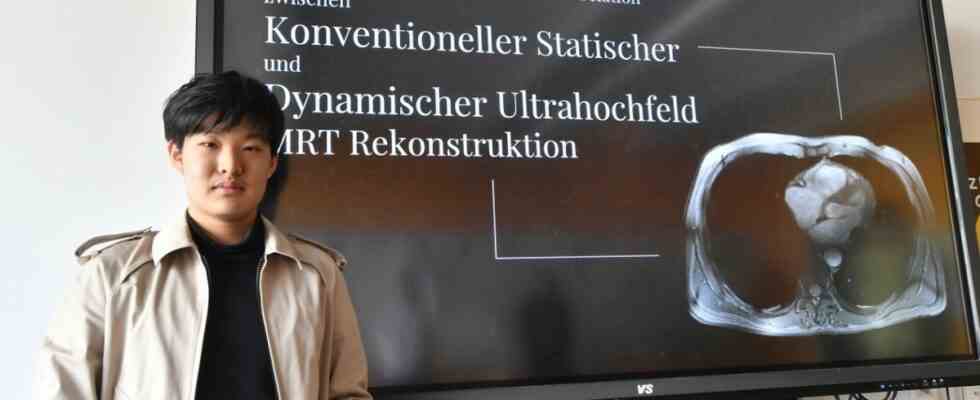Shizhe He is one of eleven winners. The twelfth grader from the Otto-von-Taube-Gymnasium took first place in Bavaria in this year’s “Jugend forscht” competition in the mathematics and computer science category and thus qualified for the national competition. Shizhe He is a student at the TUM College of the Gauting School and is about to graduate from high school. He has investigated the extent to which artificial intelligence can shorten the time spent in computer tomographs.
Together with his chair at the Technical University (TU) Munich, he is investigating a medical application area of mathematics and computer science, namely magnetic resonance imaging, or MRI for short. These are very important to accurately depict the human anatomy. The problem is that the tests in the tube-like devices take a long time. “For many people it is impossible to keep their head still for at least 60 minutes, for example small children or people who cannot stand the confinement of the MRI,” explains the student. In his work, he used artificial intelligence (AI) to investigate whether this time could be reduced to 15 minutes, for example. By reducing the time, information is lost in the images. With the AI, He tried to restore them. In his focus, he concentrated on the use of MRT scanning devices, because the full technical potential of these was not yet tapped. Principal Sylke Wischnevsky is enthusiastic: “He really is an exceptional talent. So talented and also such a friendly, great person.” He wrote his more than 70-page work in English and received first place in the national “Jugend forscht” competition in the mathematics and computer science category as well as two special prizes.
The opportunity to work with the Technical University of Munich arose through the TUM College program of the Otto-von-Taube-Gymnasium in Gauting in cooperation with the Technical University of Munich. The participants can spend one day a week at a chair at the TU and support research fields there. The work that is written there then replaces the W seminar paper that the other high school graduates have to write. The works that are created in cooperation with the TU are usually longer and, above all, more demanding in terms of content. Lessons missed due to the cooperation must be made up on the other school days. As a result, free periods that are available to other students are lost.
He is also about to take his Abitur exams. As a result, he has almost no time to prepare separately for his third lecture, because the written exams will begin after the Easter holidays. The oral ones then follow shortly before the final round of the competition. With his victory in the mathematics and computer science category, the ambitious student has qualified to take part in the national final of “Jugend forscht”. There he will be able to represent the Free State in Lübeck on May 26th and present his work again.
In addition to Shizhe He, Daniel Henke and Lukas Staar (from left) are also successful in the “Jugend forscht” competition.
(Photo: Georgine Treybal)
Lukas Staar and Daniel Henke also qualified for the second round of Jugend forscht and thus qualified for the state level. They also competed in the mathematics/computer science category and received two special prizes for their work. They are also members of the TUM College. In their work they dealt with fluid dynamics and used both their own data set and a specially created artificial intelligence. Her work still includes basic research. Their findings could be used, for example, in injecting fuel into the engine.

